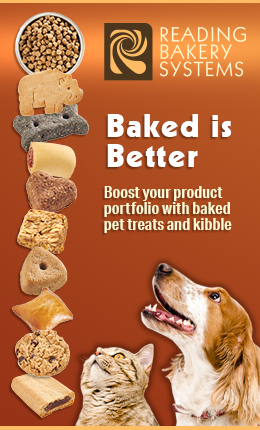Most pet food includes animal protein, which requires the slaughter of animals and is ultimately a source of planet-warming gases. Rich Kelleman's Colorado-based Bond Pet Foods, however, is aiming to sidestep both pitfalls by making those same proteins in a biotech process.
His inspiration comes in part from his own disgust over the treatment of livestock on its way to the food supply. He was also shocked when he read a study showing that pets in the US consume as many calories sourced from animals as France's population, which numbers more than 65 million.
Livestock's impact on climate change added to his resolve, as raising animals for food is responsible for a whopping 14.5 percent of human-linked greenhouse gas emissions, according to UN data. But vegetables alone aren't necessarily enough nutrition for cats and dogs.
Kelleman was convinced by research that if a company could 'crack the code' for lab-grown pet food there would be a market for it. 'For dogs and cats, it has to be palatable, but it doesn't have to look like a fully formed steak or breast,' Kelleman told AFP during a visit to the startup.
'It's not about the mouth feel; the sizzle; the taste, and the texture that have to be so precise for people to embrace it.' In development, Kelleman's startup drew blood from a pedigree chicken, extracted DNA from the sample and inserted it into a microbe.
The resulting microbe was added to a fermenter to produce lab-grown animal proteins. 'It sounds like a weird, strange process, but it is something that has been around for quite a while,' Kelleman said.
– Nutty, with a hint of cheese –
His dog, Rumples, seems to enjoy it. And an AFP reporter given a sample noticed its nutty flavor that includes notes of parmesan cheese. But the company has many hurdles to cross in its quest to become the new normal in pet food. First is the price, because even environment-loving 'dog moms' watch their budgets when it comes to the cost of kibble. Using fermentation tanks has enabled Bond to cut the cost of protein to $5 per kilogram (2.2 pounds) from $100 per kilogram.
Chief technology officer Tony Day says the price can be driven even lower. It is expected to take at least two years, though, of tests and evaluation to assure regulators that the kill-free pet food is a safe and viable. Bond is aiming to sell their proteins to pet food makers by the second half of 2023.
A crucial question is whether the lab-grown pet food passes the smell test with humans concerned about the well-being of their animal friends. In a park not far from the startup in the Colorado city Boulder, dog owners were interested but wary. 'I'd like to think I could give my dogs real meat protein without harming the planet,' Rochelle Loughry said while watching her two Australian Shepherds.
'In theory it looks good, but we should know if, in the long term, the benefits are the same as with real meat,' said another dog owner Jason Ackermann. Meat in pet food often arouses fierce debate. Greg Okin received raging criticism from both conservatives and animal rights activists for his academic study of pet protein consumption, which helped inspire Kelleman's startup.
'I think the fear was that I was telling people kill their cats and dogs, or not feed them, which is not what I was saying at all,' said Okin, a professor at the environment institute at the University of California, Los Angeles.
'I got a lot of hate.'
Julie JAMMOT
You could be interested: High-level nutrition: The revolution in pet health







































